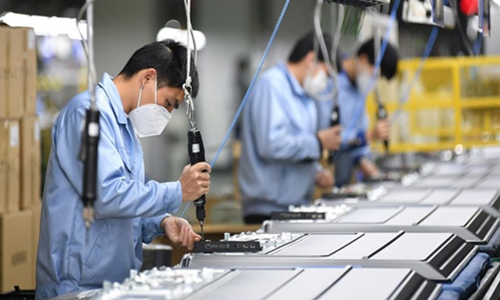HOME >> OPINION
COVID-19 puts global health, trade to the test
Source:Global Times Published: 2020/2/25 23:43:41

Staff members work at a workshop of Skyworth in Guangzhou, south China's Guangdong Province, February 10, 2020. Chinese authorities are carefully balancing efforts to control the novel coronavirus epidemic and minimize its impact on the economy as millions of people head back to work Monday after an extended holiday. Photo: Xinhua
WHO Director-General Tedros Adhanom Ghebreyesus said on Monday that "we are not witnessing the uncontained global spread of this virus" at the current stage, so "using the word 'pandemic' now does not fit the facts." He also stated that this is not the time for us to "focus on what word we use," but "a time for all countries, communities, families and individuals to focus on preparing."
As Tedros put it, we should not pay much attention to the WHO's careful wording and not be confused by whether this epidemic has become a pandemic. It is already hard to avoid the widespread and impact of the coronavirus which will last for some time. Those who are too optimistic about the future situation might be caught unprepared and pay a greater price.
It is perhaps unlikely to stop the worldwide spread of the coronavirus. South Korea, Japan, Italy and Iran have long been aware of the huge risks of this epidemic and have already taken steps which they assumed to be effective. Some of them had restricted interactions with China and some others cut off personnel exchanges with China, but these four countries have become the worst-infected areas apart from China.
We have to make a gloomy prediction - the above four countries may not be the last ones to suffer severe outbreaks. Countries with close contacts with these four nations share similar social conditions and adopt similar initial measures to prevent and control the epidemic. We cannot rule out the possibility that the coronavirus will become rampant in other countries.
In addition to the epidemic, the world's economy will inevitably encounter an intense impact. The stock markets of almost all countries fell on Monday - the Dow Jones tumbled more than 1,000 points - reflecting a bad perspective of markets. Fear of the COVID-19 will spread together with the epidemic, severely damaging world trade and supply chains.
Recent US moves proved that Washington will take selfish measures as the crisis deepens. This will put more obstacles for the international community to jointly battle the virus, increasing the risk every country will have to face. What happened in China has showed it is hard for any single country to handle the epidemic as severe as that in Wuhan, especially when large-scale international aid is not a realistic option.
The epidemic in Wuhan once collapsed the city's medical system. The Chinese government has reallocated the entire country's resources and sent over 40,000 medical workers from outside of Wuhan, and thus finally overturned the situation there. It would be a scary scene if a second "Wuhan" appeared in some medium-sized country, which has to face the epidemic all on its own.
The world's health system, trade system, and humanitarian system within world governance would all face tests. People are not that rational, hence the world's health system must not be brought to a collapse. Otherwise, panic would lose control, leading to a situation where all other systems are endangered.
As the situation is increasingly critical, we recommend that other countries take a closer look at China's extraordinarily tough experience in the past month. There have been various voices in the West discussing China. But the reality is, China has firmly controlled the epidemic within its realm. The result is more powerful than an argument. To control the epidemic from spreading in the real world is far more important than other affairs.
Posted in: EDITORIAL